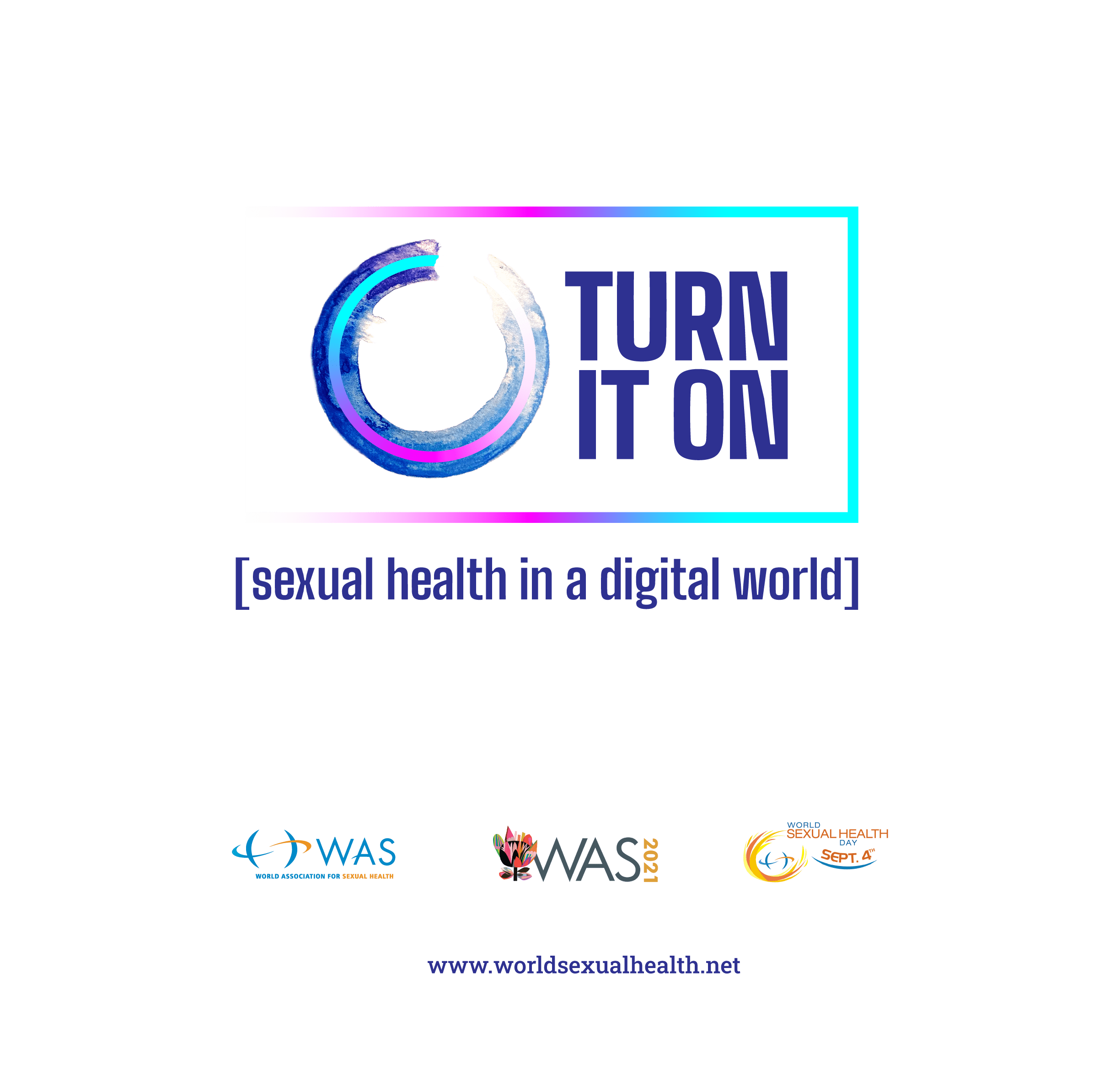TURN IT ON! Sexual Health in a Digital Age | World Sexual Health Day 2021
TURN IT ON! Sexual Health in a Digital Age is the 2021 World Sexual Health Day theme, aiming to ignite awareness of sexual health and rights and enforce them, due to violations and abuses of sexual rights in digital spaces. Digital resources can offer a perfect environment to dissipate health-information and promote involvement in health self-care, particularly in reaching groups that are not reached with traditional methods such as young people. However, it is equally pertinent to acknowledge that different forms of marginalisation and access gaps can occur between vulnerable groups and regions of the world that do not easily access digital platforms or online information. Senior Sexual Health Advisor for Adolescents and Young People Doortje Braeken also points out that ‘there are no real standards for online Comprehensive Sexuality Education (CSE), as there are for face-to-face CSE’.
As the boundaries of analogue and digital spaces increasingly blur, with rapid exchanges of information happening online, smartphone usage reveals the depth at which technology and digital information penetrates daily life. While Internet-enabled technologies and communications can provide the perfect toolset for public health promotions by enabling rapid exchanges of information at scale, the need to examine how digital sexual health and rights information is shared, exchanged, mediated, and understood in digital spaces has never been greater.
Sexual Health and Rights are topics at the very core of Share-Net International, we wanted to reflect on how our network leverages digital assets and connected spaces to share and promote digital sexual health and rights knowledge, while acknowledging limitations and other issues that can arise.
We spoke to Diana Carolina Peña Bolívar (left), the Coordinator of Share-Net Colombia, and Senior Sexual Health Advisor for Adolescents and Young People Doortje Braeken (right), to get their take on the ever-changing landscape of SRHR work in a digital era.


How have digital and online resources changed the sexual health & rights landscape in the past decade?
Diana-Carolina: The digital era has enabled wider access to information on sexual and reproductive rights and health facilitating self-management for informed decision-making (through content on websites, apps, social networks, etc.). This has meant the possibility for each person, based on their interests, to search for additional online resources that they could not traditionally access from their school, family, or friends. Recently, in our change package project, we identified that young people recognize that there are barriers in the search for answers about their sexual and reproductive health and rights, since in many cases their schools have conservative chairs in this regard or their families are not so open to talk about these issues, so they have found in the digital world a confidential space (although not always safe) to clarify their doubts. In addition, the use of social networks or different platforms have facilitated generating spaces for awareness and transformation in the face of problems such as gender violence, abortion, and gender identity, among others.
Doortje: There is more awareness on sexual rights, CSE and sexual pleasure, and more attention to this from bloggers and vloggers – they show more creativity and courage than the face to face and non-digital materials do. This also raises some challenges; there is still a very traditional use of CSE methods and training. For example, teacher training in South Africa, and further, there are no real standards for online CSE, as there are for face-to-face CSE. We also need to create more awareness of international digital powers, for good digital sexuality education on health and rights, you need resources and technological know-how to censor sexually abusive material and fake information. Also, the “traditional gate keepers” such as state or religious authorities share their online power with supranational commercial organisations such as Facebook and Google, which control access to information by algorithms which restrict access to content and monetary incentives such as paid advertisements.
How do you use digital content to share information about sexual health and rights?
Diana-Carolina: From Share-Net Colombia we have not yet shared digital content about SRHR, however, we hope to consolidate our website and social networks to share and socialize quality information, focused on different audiences, according to the needs of our social framework. Profamilia, our host organization, has successfully used digital media to disseminate research results, through webinars or live broadcasts, as well as relevant information on sexual and reproductive health and awareness campaigns around issues such as human trafficking, safe abortion, Venezuelan migration, respect for sexual diversity, fertility, youth, among others.
Doortje: I have co-developed an online workshop on sexual pleasure for medical professionals, nurses, and social work students, an online sexual pleasure checklist with Share-Net Netherlands, and a sexual pleasure online assessment tool with GAB (Global Advisory Board) for Sexual Health and Wellbeing. Further I have given several interactive online and pre-recorded trainings and workshops for Psychology students, social workers, midwives, sexologist students, and for the summers school at the University of Amsterdam, the media department at the University of Beirut, and for post-doc courses in Suriname with Social Workers and Midwives.
What are your favourite digital sexual health & rights resources app, social media account, website, or other digital resource you think everyone should know about?
Diana-Carolina: ProFamilia’s Instagram page, unfpa.org – the United Nations Sexual and Reproductive Health Agency, the CSE Instagram account Emma & Yo, and the blog of 14 Por Colombia, the campaign for abortion up to 14 weeks in Colombia.
Doortje: Love Matters, especially Love Matters India – “Blush-free facts and stories about love, sex and relationships. Got a question, ask our experts.”
Digital and analogue spaces are increasingly blurring, do you think this helps young people and remote or marginalised populations to be informed about sexual health and rights, or does this also open space for vulnerabilities and exploitation?
Diana-Carolina: Although there are several positive characteristics about the digital era, like the access to information and the democratization of knowledge, new problems converge, and others are exacerbated. On one side, the marginalization of people in poverty both by the absence of means of access (device and connection) and by literacy is increasing. In our context, people living in rural areas in many cases don’t have access to internet or electricity, and even in indigenous communities the language becomes a barrier because they have their own dialect. This marginalization happens in many other areas but has a greater impact on SRHR access since people (especially women) are unable to make informed decisions regarding their health and rights. On the other hand, the absence of clear regulation on available information on internet, cybercrimes, or establishment of legal limits on the use of the internet and the guarantee of privacy, facilitate the occurrence of violations of sexual and reproductive rights such as bullying of the LGBTIQ+ community and sexual and commercial exploitation of people, especially children and adolescents.
Doortje: Digital spaces offer new possibilities for young people, including marginalized young people, to be reached by, lead and influence creation and sharing of knowledge on sexual health and rights. At the same time, just as in off-line spaces, bullying and coercion can take place including sexual and gender-based violence. It can be difficult for moderators to create safe spaces in closed or controlled platforms, where young people’s privacy or anonymity is protected. This is cost and labour intensive, raises questions about freedom of speech, and young peoples need and their rights to make up their own mind based on a variety of perspectives.
We would like to thank Diana and Doortje for their comments. For more on World Sexual Health Day and the wider online campaign, visit worldsexualhealth.net/world-sexual-health-day for more information and resources. They have also made the following publications available for additional reading:
Title: Sexuality Education in the Digital Era: Intrinsic and Extrinsic Predictors of Online Sexual Information Seeking Among Youth. S Nikkelen, J van Oosten, & M van den Borne. 2020, The Journal of Sex Research, 189-199. Published by Taylor & Francis Group.
Title: Arrow for Change – women’s, gender, and rights perspectives in health policies and programmes. Sexuality, Sexual and Reproductive Health and Rights, and the Internet. Published by the Asian-Pacific Resource & Research Centre for Women. Volume 22, no.1.
